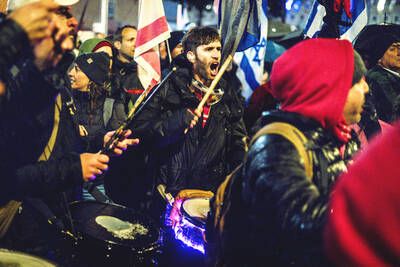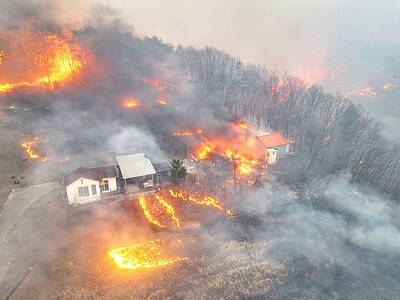Spain was on Friday bracing for its biggest ever outdoor drinking party, with tens of thousands of young people expected to show up nationwide to guzzle hard liquor, wine and beer overnight.
Thousands of police were preparing for the event known as macro-botellon, which had been arranged anonymously through cell phone and internet messages with some 20 cities vying for which one would draw the largest number of people to get drunk at squares or parks.
The event was based on a practice known as botellon (from the word botella meaning bottle), which has evolved in Spain over the past decade.
It basically consists of youths, mainly between 15 and 24 years of age, gathering outdoors to drink together.
They often make so much noise it keeps locals from sleeping at night and leave behind a mess of garbage, vomit pools, glass shards and graffiti.
The disturbance has prompted some cities, such as Madrid and Barcelona, to prohibit such drinking outdoors and to impose fines of up to 30,000 euros (US$36,500) on those who break the rule.
Yet the threat of police repression did not impress the anonymous people who launched the call for the macro-botellon in the southern city of Granada in an attempt to outdo Seville, where a street bash of more than 3,000 youngsters made national headlines a month ago.
The party call quickly spread to other cities, alarming Spanish Health Minister Elena Salgado who called it an "attack against health" and urged parents to keep under-age teenagers from attending such events on Friday night.
The young practitioners of the botellon say they drink out of doors simply because it is too expensive to do so in bars or discotheques.
Analysts say the botellon also reflects a certain change in drinking habits in Spain, where people traditionally sipped wine with meals while youths are now turning to Nordic-style heavy drinking.
Studies show that 38 percent of people aged between 14 and 18 years drink alcohol regularly in Spain. Girls drink as much as boys, and the number of youngsters drinking is on the increase.
More than just an expression of teenage rebelliousness, the botellon has also been described as a deeper symptom of ill-ease in a consumerist culture where young people are expected to spend money on concerts, movies and other forms of leisure.
Some say massive drinking is a form of protest typical of a permissively raised generation looking for "easy and cheap transgression," in the words of Antoni Gual, a Barcelona physician specialized in health troubles caused by excessive alcohol consumption.

DEATH CONSTANTLY LOOMING: Decades of detention took a major toll on Iwao Hakamada’s mental health, his lawyers describing him as ‘living in a world of fantasy’ A Japanese man wrongly convicted of murder who was the world’s longest-serving death row inmate has been awarded US$1.44 million in compensation, an official said yesterday. The payout represents ¥12,500 (US$83) for each day of the more than four decades that Iwao Hakamada spent in detention, most of it on death row when each day could have been his last. It is a record for compensation of this kind, Japanese media said. The former boxer, now 89, was exonerated last year of a 1966 quadruple murder after a tireless campaign by his sister and others. The case sparked scrutiny of the justice system in

The head of Shin Bet, Israel’s domestic intelligence agency, was sacked yesterday, days after Israeli Prime Minister Benjamin Netanyahu said he no longer trusts him, and fallout from a report on the Oct. 7, 2023, Hamas attack. “The Government unanimously approved Prime Minister Benjamin Netanyahu’s proposal to end ISA Director Ronen Bar’s term of office,” a statement said. He is to leave his post when his successor is appointed by April 10 at the latest, the statement said. Netanyahu on Sunday cited an “ongoing lack of trust” as the reason for moving to dismiss Bar, who joined the agency in 1993. Bar, meant to

DITCH TACTICS: Kenyan officers were on their way to rescue Haitian police stuck in a ditch suspected to have been deliberately dug by Haitian gang members A Kenyan policeman deployed in Haiti has gone missing after violent gangs attacked a group of officers on a rescue mission, a UN-backed multinational security mission said in a statement yesterday. The Kenyan officers on Tuesday were on their way to rescue Haitian police stuck in a ditch “suspected to have been deliberately dug by gangs,” the statement said, adding that “specialized teams have been deployed” to search for the missing officer. Local media outlets in Haiti reported that the officer had been killed and videos of a lifeless man clothed in Kenyan uniform were shared on social media. Gang violence has left

‘HUMAN NEGLIGENCE’: The fire is believed to have been caused by someone who was visiting an ancestral grave and accidentally started the blaze, the acting president said Deadly wildfires in South Korea worsened overnight, officials said yesterday, as dry, windy weather hampered efforts to contain one of the nation’s worst-ever fire outbreaks. More than a dozen different blazes broke out over the weekend, with Acting South Korean Interior and Safety Minister Ko Ki-dong reporting thousands of hectares burned and four people killed. “The wildfires have so far affected about 14,694 hectares, with damage continuing to grow,” Ko said. The extent of damage would make the fires collectively the third-largest in South Korea’s history. The largest was an April 2000 blaze that scorched 23,913 hectares across the east coast. More than 3,000